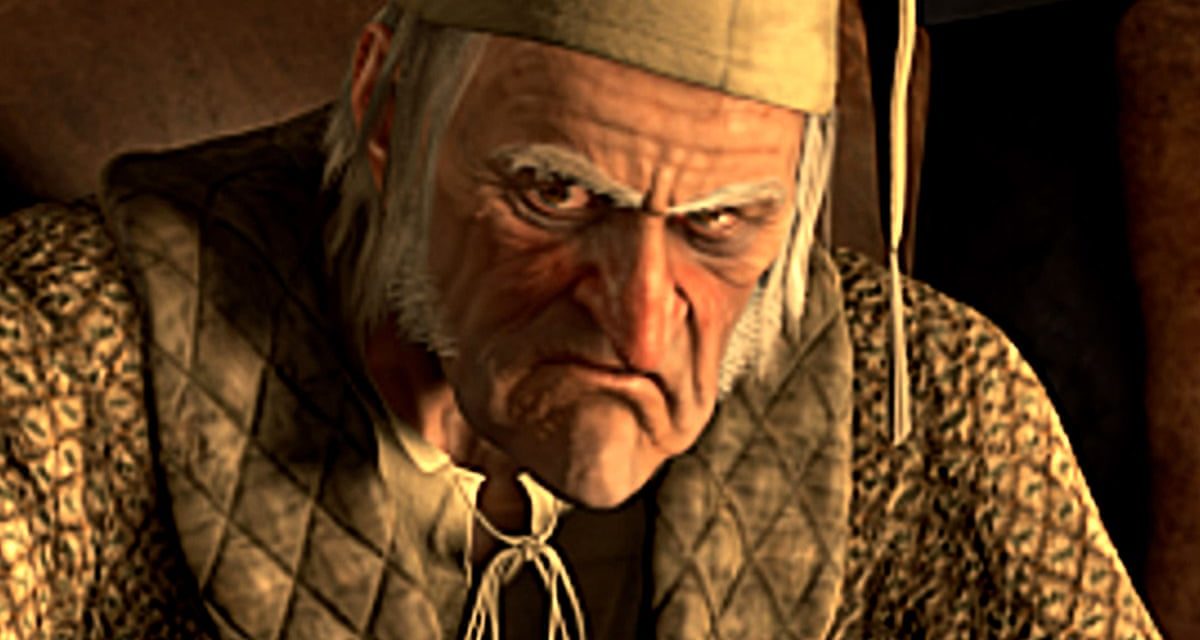“Scrooge was better than his word. He did it all, and infinitely more . . . He became as good a friend, as good a master, as good a man as the good old City knew, or any other good old city, town, or borough in the good old world.” – Charles Dickens, A Christmas Carol
I love a conversion story. Especially at Christmas. You can have your Rudolph, your Frosty, your “Wonderful Life” and all those other yuletide tales of kindly underdogs who deservedly triumph over adversity. I, myself, am a sucker for that far less common narrative – the black heart utterly transformed. The undeserving, unbearable wretch redeemed.
The first kind of story is sweet and satisfying. The second kind is life-shattering… in a good way. Miracles are like that.
A Christmas Carol is that second kind of story – my favorite kind. But sometimes I wonder about old Ebenezer Scrooge. Dickens tells us that Scrooge never wavered after his consciousness-raising all-nighter with the ghosts. His transformation was absolute. A complete 180. But I find that difficult to believe, don’t you? Old habits really do die hard. Surely Scrooge had his backsliding moments – days when the old greediness flared up, or the selfishness, or just the plain ol’ persnickety nastiness. But I also like to believe that when those old habits did reappear, it was only temporary, because now Scrooge had a weapon against them.
Dickens gives us a little insight into that weapon right at the end of the story:
“Some people laughed to see the alteration in him, but he let them laugh, and little heeded them; for he was wise enough to know that nothing ever happened on this globe, for good, at which some people did not have their fill of laughter in the outset; and knowing that such as these would be blind anyway, he thought it quite as well that they should wrinkle up their eyes in grins, as have the malady in less attractive forms. His own heart laughed: and that was quite enough for him.”
What Scrooge gained that night with the ghosts – his secret weapon – was humility. The ability to laugh at himself. And with that humility came wisdom. And peace. And joy. It was a gift outright, one bestowed upon Scrooge – out of the blue – despite his supreme unworthiness. As Dickens lays it out for us, Scrooge is “made good” in spite of, not because of, his own will. He is literally dragged into goodness, kicking and screaming. A Christmas Carol is not a “religious” story, per se, but Scrooge’s conversion – his crash encounter with the terrible, wonderful power of divine love – is as sure, and as uninvited, as that of any sinner who ever got smacked into sainthood.
Another such Christmas anti-hero – one I can’t get enough of – is the Grinch who stole Christmas… then gave it back. As his story begins, the Grinch is arguably a darker, more sinister character – and a bigger lost cause – than Ebenezer Scrooge. While Scrooge is cranky, unpleasant and completely unconcerned with the welfare of others, his greatest sins tend to be those of neglect. The Grinch, on the other hand, is not just devious, dishonest, and intolerant… he actually spends all his time and energy plotting tohurtpeople. Lovely, innocent people! (Okay, lovely, innocent Whos… but you get my drift.)
We don’t know why the Grinch is so bad, exactly. Unlike the folks who made the movie starring Jim Carrey, Dr. Seuss didn’t feel compelled to offer a back story of childhood suffering and abuse, but gave us only these few verses to ponder:
It could be his head wasn’t screwed on just right.
It could be, perhaps, that his shoes were too tight.
But I think that the most likely reason of all,
May have been that his heart was two sizes too small.
In his unfailing wisdom, Dr. Seuss knew what few of us care to acknowledge these days: that some people are bad for no good reason. For people like that, the only real hope is something drastic. Something radical. I call it “conversion.” You might call it something different. Whatever you call it, it’s nothing short of a metaphorical heart transplant.
And that’s just what happens to the Grinch. Right there at the tiptop of Mt. Crumpit, while eagerly awaiting the fallout from his dastardly deed – with his poor, long-suffering mutt and his sleigh full of stolen Christmas – the Grinch has a classic “mountaintop moment.” You remember. Everyone who’s ever had – or been – an American child remembers. The faint sound of Who voices rising up through the clouds… Fah-who for-aze, dah-who dor-aze…The strange, Seussian praise song wafting skyward… Fah-who rah-moose…The circle of Whos swaying, hands clasped, eyes uplifted… Dah-who dah-moose… The Grinch’s horrible face, completely transformed – made radiant – as the truth dawns on him…
Maybe Christmas,” he thought, “doesn’t come from a store.”
“Maybe Christmas… perhaps… means a little bit more!”
And what happens then? “Well, in Whoville they say, that the Grinch’s small heart grew three sizes that day!”
Just like that. A miracle. Next thing you know, he’s cheerfully carving the roast beast.
I told my daughter I was writing a column about some of my favorite Christmas characters – Scrooge and the Grinch. Without missing a beat, she said, “Mom, those characters are kind of alike. They both start out really bad, then turn good at the end.” My brilliant kid. She cut right to the chase – straight to the crux of these stories, and why I love them so.
As much as I enjoy a “good guys finish first if they just hang in there” tale, I suspect there’s a lie at the heart of that story. I’ve seen too many bad things happen to good people, and vice versa. I don’t need to be sold a bill of goods about “karma” and life being “fair” and “things working out in the end.” Deep down, I don’t believe in that story.
But what I do believe in – because I’ve experienced it, firsthand – is conversion. Which comes from the word “convert.” Which means “to change, transform, transmute, alter, turn.” I know that conversion is real, and I know that it makes all the difference in the world – not because it changes the world, but because it changes our perspective on the world… and, thus, our approach to the world. But it’s not a one-time deal. Despite what Dickens tells us, I think conversion must happen over and over, again and again. I have to keep seeking transformation – keep turning toward love – every minute of every day. And I can’t always do it alone. Like Scrooge, I sometimes need a wonderful, terrible ghost to wake me up, shake me up, and remove the scales from my eyes.
This Christmas – like every Christmas – I don’t come seeking assurance that everything will turn out okay for me as long as I’m good. No. I come seeking assurance that I will turn out okay, in spite of myself. That what’s bad can be made good, through grace. That Love (with a capital L) really does conquer all. Because I know that, when left to my own devices, I’m a lot more like Scrooge than George Bailey. By nature, I have more in common with the nasty, gnarly Grinch than with that sweet, courageous reindeer named Rudolph. I wish I were naturally kind and brave like Frosty, but all too often, I feel more like the Abominable Snowman. So, I need divine intervention. Every day.
My favorite stories of Christmas – like Christmas, itself – remind me that it’s always there for the asking. Even for the likes of me.
(Author’s Note: This essay first appeared in Lowcountry Weekly in December 2011. I still mean every word.)







